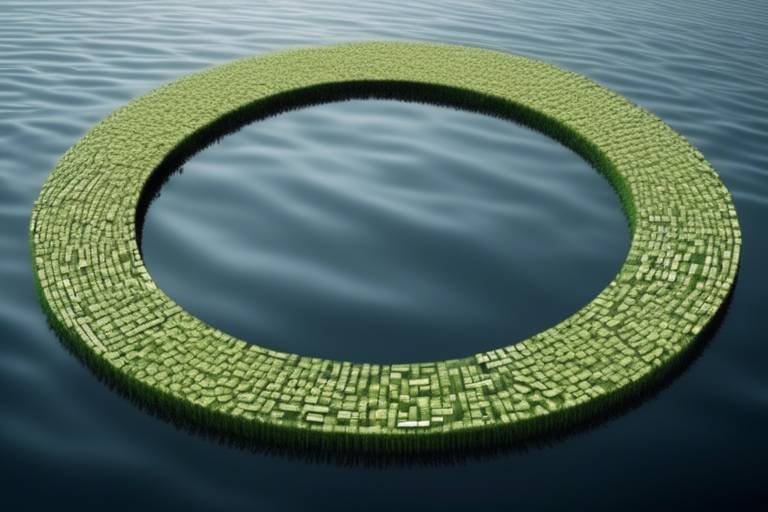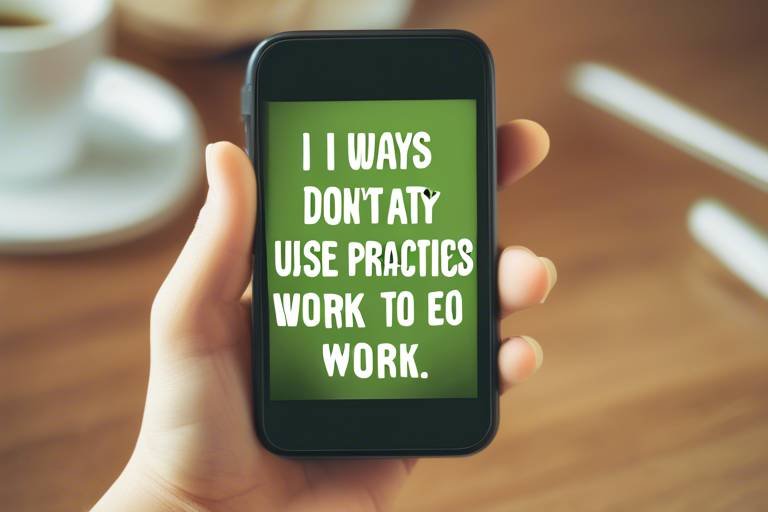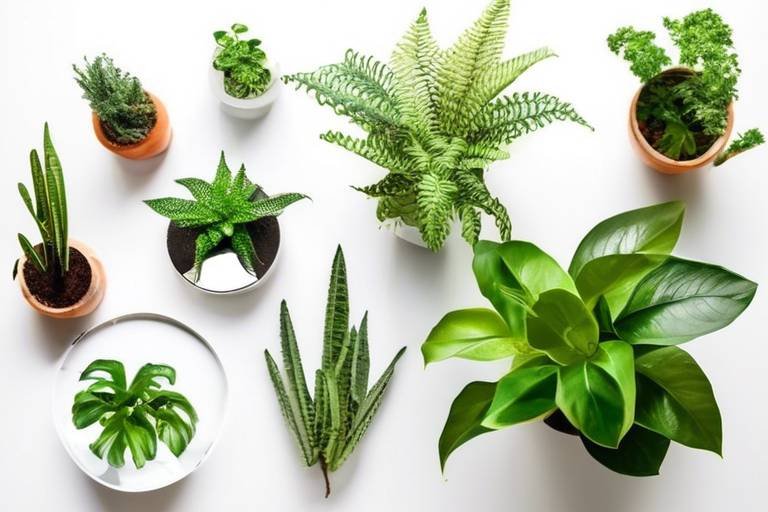How to Make Your Own Natural Fertilizer
Are you ready to take your gardening to the next level by creating your very own natural fertilizers? Say goodbye to harmful chemicals and hello to sustainable practices that benefit both your plants and the environment. By making your own natural fertilizers, you can enhance soil health, promote beneficial microbial activity, and ultimately see long-term improvements in your garden's vitality.
One of the key benefits of natural fertilizers is their ability to improve soil structure, creating a healthy environment for plant roots to thrive. Unlike synthetic options, natural fertilizers work in harmony with the soil, providing essential nutrients while maintaining its natural balance. This leads to healthier plants that are more resistant to pests and diseases, ensuring a bountiful harvest.
When it comes to types of natural fertilizers, the options are endless. From nutrient-rich compost made from kitchen scraps to manure tea that boosts plant growth, there is a natural fertilizer for every gardening need. Bone meal provides a phosphorus and calcium boost, while seaweed extract enhances soil health and increases plant resistance to stress.
Creating your own compost fertilizer is a rewarding process that turns organic waste into a valuable resource for your garden. By following a simple step-by-step guide, you can transform kitchen scraps, yard waste, and other organic materials into nutrient-rich compost that will nourish your plants naturally. With the right compost bin setup and proper maintenance, you can easily incorporate composting into your gardening routine.
For a quick and effective fertilizer solution, consider making manure tea using manure and water. This simple recipe provides a nutrient-rich liquid fertilizer that can be easily absorbed by plants, promoting healthy growth without the use of synthetic chemicals. Just be sure to follow precautions when using manure tea to prevent any potential risks to your plants.
If you're looking to boost phosphorus and calcium levels in your garden, try creating a homemade bone meal fertilizer using animal bones. By following a specific recipe to make bone meal powder, you can provide essential nutrients to your plants in a natural and sustainable way. Learn the best practices for applying bone meal fertilizer to ensure optimal results without harming your garden.
Seaweed extract is another natural fertilizer that offers a wide range of benefits for plant growth. Rich in nutrients and trace elements, seaweed extract enhances soil health, improves plant resilience to environmental stress, and boosts overall crop yield. Discover the wonders of seaweed extract and how it can transform your gardening practices for the better.
When it comes to applying natural fertilizers, timing and dosage are key factors to consider. By following best practices and proper application techniques, you can maximize the effectiveness of natural fertilizers while minimizing any potential risks. Say goodbye to harmful chemicals and embrace the power of natural fertilizers for a healthier and more sustainable garden.

Benefits of Natural Fertilizers
Natural fertilizers offer a plethora of benefits that go beyond just nourishing plants. These eco-friendly alternatives not only enhance soil health but also promote a sustainable gardening approach that benefits the environment in the long run. Unlike synthetic fertilizers that can harm beneficial microbes in the soil, natural fertilizers work in harmony with nature, improving soil structure and fostering a healthy ecosystem for plants to thrive.
One of the key advantages of natural fertilizers is their ability to promote beneficial microbial activity in the soil. These microbes play a crucial role in breaking down organic matter and releasing essential nutrients that plants need for growth. By using natural fertilizers, gardeners can create a balanced and nutrient-rich environment that supports plant health and vitality.
Furthermore, natural fertilizers provide long-term benefits to both plants and the environment. Unlike synthetic fertilizers that can leach chemicals into the soil and waterways, natural fertilizers break down slowly, releasing nutrients gradually over time. This slow-release mechanism not only ensures a steady supply of nutrients to plants but also reduces the risk of nutrient runoff and pollution, making natural fertilizers a sustainable choice for gardeners.

Types of Natural Fertilizers
When it comes to natural fertilizers, there is a wide array of options to choose from, each offering unique benefits for your plants and soil. One of the most popular types of natural fertilizers is compost, which is essentially decomposed organic matter rich in nutrients. Compost not only provides essential nutrients to plants but also improves soil structure and water retention capacity.
Another common natural fertilizer is manure, which is a rich source of nitrogen, phosphorus, and potassium. Manure can be used to enrich the soil and enhance plant growth, making it a valuable addition to any organic garden. Additionally, bone meal fertilizer, made from ground animal bones, is an excellent source of phosphorus and calcium, essential for root development and overall plant health.
Seaweed extract fertilizer is another natural option that offers a range of benefits for plant growth. Packed with micronutrients, seaweed extract helps improve soil health, increase plant resistance to stress, and boost crop yield. Its natural properties make it a popular choice among organic gardeners looking to enhance the overall health of their plants.
Each type of natural fertilizer has its own unique nutrient content and benefits, making it important to choose the right option based on your plants' specific needs. By incorporating a variety of natural fertilizers into your gardening routine, you can create a balanced and sustainable environment for your plants to thrive.

DIY Compost Fertilizer
Creating your own compost fertilizer is not only a great way to reduce waste but also a fantastic way to nourish your garden naturally. By recycling kitchen scraps, yard waste, and other organic materials, you can produce nutrient-rich compost that will benefit your plants and soil. Composting is a simple yet effective process that can be done right in your backyard, providing you with a sustainable source of fertilizer for your garden.
One of the key benefits of DIY compost fertilizer is its ability to improve soil structure and fertility. Compost adds essential organic matter to the soil, helping to retain moisture, improve drainage, and promote a healthy environment for beneficial microorganisms. This, in turn, leads to healthier plants with stronger root systems and increased resistance to pests and diseases.
To create your own compost, you can start by collecting a mix of green and brown materials. Green materials include fruit and vegetable scraps, coffee grounds, and grass clippings, while brown materials consist of dried leaves, straw, and cardboard. Layer these materials in a compost bin or pile, making sure to keep the pile moist and aerated to facilitate decomposition.
Over time, the organic matter will break down into dark, crumbly compost that is ready to use in your garden. You can apply the compost to the soil around your plants or mix it into potting soil for containers. The nutrients in the compost will slowly release into the soil, providing a steady source of nourishment for your plants throughout the growing season.
Using DIY compost fertilizer is not only cost-effective but also environmentally friendly. By recycling organic waste into valuable fertilizer, you are reducing the amount of waste that ends up in landfills and minimizing the need for chemical fertilizers. Additionally, composting helps to sequester carbon in the soil, contributing to efforts to combat climate change.
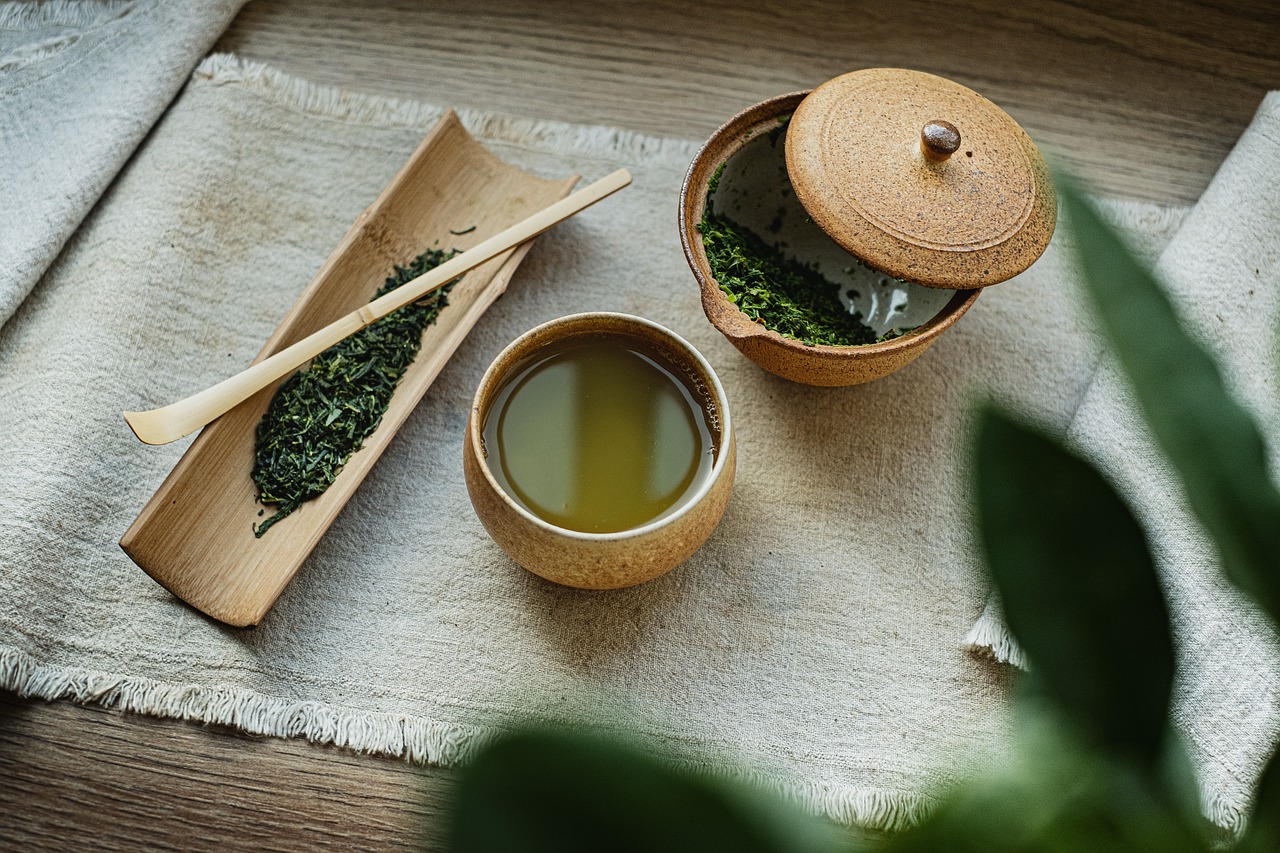
Manure Tea Fertilizer
Manure tea fertilizer is a simple yet powerful natural fertilizer that can significantly boost plant growth and soil health. By steeping manure in water, you can create a nutrient-rich solution that provides essential minerals and nutrients for your plants.
To make manure tea fertilizer, start by filling a container with water and adding a generous amount of well-aged manure. Let the mixture steep for a few days to allow the nutrients to leach into the water. Once ready, dilute the manure tea with water to the desired strength and apply it to your plants as a soil drench or foliar spray.
Manure tea fertilizer is particularly beneficial for organic gardening practices as it helps improve soil structure, increase microbial activity, and enhance nutrient uptake by plants. However, it is essential to use well-aged manure to avoid introducing harmful pathogens to your garden.
When using manure tea fertilizer, it is crucial to follow proper safety precautions to prevent contamination and ensure the health of your plants. Avoid using fresh manure, as it can burn plant roots and introduce harmful bacteria. Additionally, always wash your hands thoroughly after handling manure to prevent the spread of pathogens.
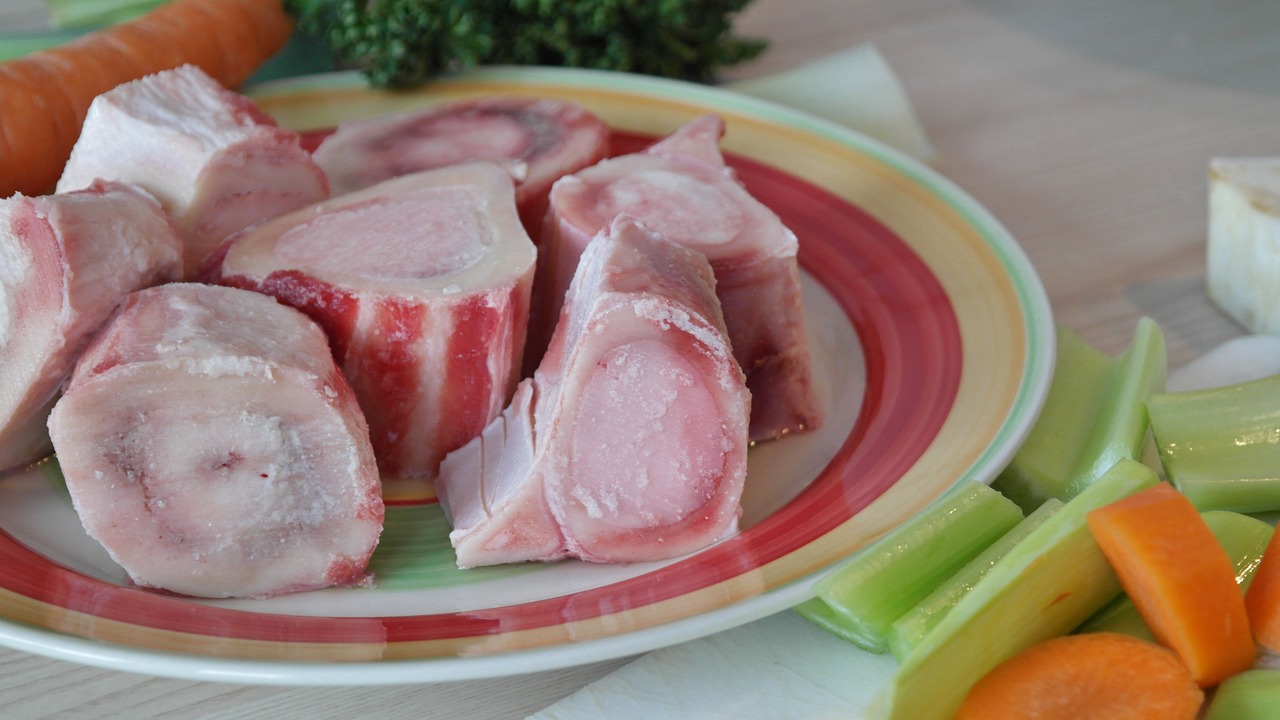
Bone Meal Fertilizer Recipe
Creating your own bone meal fertilizer is a simple yet effective way to boost phosphorus and calcium levels in your garden soil. By using animal bones, you can produce a nutrient-rich fertilizer that promotes healthy plant growth and development. Follow this easy recipe to make your homemade bone meal powder and learn how to apply it for maximum benefits.
To make bone meal fertilizer, start by collecting clean and dried animal bones. You can use bones from poultry, fish, or any other source. Avoid bones that have been cooked or treated with chemicals, as they may not be suitable for fertilizer production. Once you have gathered the bones, follow these steps to create your bone meal powder:
| Steps to Make Bone Meal Fertilizer |
|---|
| 1. Clean and dry the animal bones thoroughly. |
| 2. Crush the bones into small pieces using a hammer or a heavy object. |
| 3. Grind the crushed bones into a fine powder using a blender or a mortar and pestle. |
| 4. Store the bone meal powder in an airtight container away from moisture and sunlight. |
Once you have prepared your bone meal fertilizer, you can apply it to your garden soil to provide essential nutrients to your plants. Bone meal is particularly beneficial for flowering plants, vegetables, and fruit trees that require phosphorus for healthy root development and flower production. Sprinkle the bone meal powder around the base of your plants and gently work it into the soil to ensure proper absorption.
Remember to follow the recommended dosage instructions for bone meal fertilizer to avoid overapplication, as excessive phosphorus levels can harm certain plant species. Incorporating bone meal into your gardening routine can help improve soil fertility, enhance plant growth, and support overall plant health in a natural and sustainable way.

Seaweed Extract Fertilizer Benefits
Seaweed extract fertilizer offers a plethora of benefits for plant growth and soil health. This natural fertilizer is derived from seaweed, a nutrient-rich marine plant that provides essential elements for plants to thrive. One of the key advantages of seaweed extract is its high content of micronutrients, including potassium, magnesium, and iron, which are crucial for plant development.
Furthermore, seaweed extract acts as a growth stimulant, promoting root growth and increasing nutrient uptake in plants. It also enhances soil structure, improving water retention and nutrient availability for plant roots. Additionally, this natural fertilizer contains plant hormones such as auxins, cytokinins, and gibberellins, which regulate plant growth processes and help plants withstand environmental stressors.
When applied to plants, seaweed extract fertilizer boosts overall plant health, increases resistance to diseases and pests, and enhances the plant's ability to withstand adverse growing conditions. Moreover, the organic compounds in seaweed extract stimulate beneficial microbial activity in the soil, creating a healthy ecosystem for plant growth.
Overall, incorporating seaweed extract fertilizer into your gardening practices can lead to improved plant vigor, higher crop yields, and sustainable soil fertility. Its natural composition and diverse benefits make it a valuable asset for eco-conscious gardeners looking to enhance the health and productivity of their plants in a sustainable manner.

Application Tips for Natural Fertilizers
When it comes to applying natural fertilizers, there are a few key tips to keep in mind to ensure optimal results for your plants. Firstly, timing is crucial. Apply natural fertilizers during the active growing season of your plants to maximize nutrient absorption and support healthy growth.
Next, consider the dosage of the fertilizer. It's essential to follow the recommended guidelines for each type of natural fertilizer to avoid over-fertilization, which can harm your plants. Less is often more when it comes to organic fertilizers.
Proper application techniques are also important. Make sure to distribute the fertilizer evenly around the root zone of the plants to ensure they receive an equal amount of nutrients. Avoid direct contact with plant stems or leaves to prevent burning.
Additionally, mixing natural fertilizers with compost can further enhance their effectiveness. Compost acts as a soil conditioner and helps improve nutrient retention, creating a balanced ecosystem for plant growth.
Lastly, consider the watering schedule after applying natural fertilizers. Water the plants thoroughly after fertilizing to help activate the nutrients and ensure they reach the roots where they are needed most.
Frequently Asked Questions
- What are the benefits of using natural fertilizers?
Natural fertilizers offer numerous advantages over synthetic options. They improve soil structure, promote beneficial microbial activity, and provide long-term benefits to both plants and the environment. By using natural fertilizers, you can enhance soil health and support sustainable gardening practices.
- What are the different types of natural fertilizers available?
There are various types of natural fertilizers to choose from, including compost, manure, bone meal, and seaweed extracts. Each type has unique nutrient content, application methods, and specific benefits for different plants. Exploring these options can help you find the best natural fertilizer for your gardening needs.
- How can I make my own compost fertilizer at home?
Creating compost fertilizer at home is a simple and eco-friendly process. By using kitchen scraps, yard waste, and other organic materials, you can produce nutrient-rich compost to fertilize your garden naturally. Understanding the composting process, ideal setup for a compost bin, and proper use of compost can significantly benefit your plants.
- What precautions should I take when using manure tea fertilizer?
When using manure tea fertilizer in organic gardening, it is essential to take certain precautions to ensure plant health and safety. Diluting the manure tea properly, avoiding direct contact with plants' leaves, and following recommended application guidelines can help you utilize this natural fertilizer effectively.
- How does seaweed extract fertilizer benefit plant growth?
Seaweed extract fertilizer offers numerous benefits for plant growth, including enhancing soil health, increasing plant resistance to stress, and improving overall crop yield. With its rich nutrient content and ability to promote healthy plant development, seaweed extract is a valuable natural fertilizer option for gardeners.






